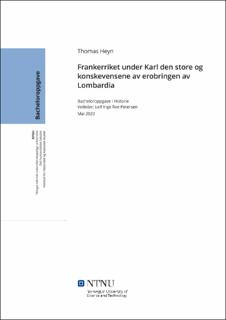| dc.contributor.advisor | Ree petersen, Leif Inge | |
| dc.contributor.author | Heyn, Thomas | |
| dc.date.accessioned | 2022-06-23T17:19:33Z | |
| dc.date.available | 2022-06-23T17:19:33Z | |
| dc.date.issued | 2022 | |
| dc.identifier | no.ntnu:inspera:110289010:71228380 | |
| dc.identifier.uri | https://hdl.handle.net/11250/3000383 | |
| dc.description.abstract | Denne bacheloroppgaven har undersøkt bakgrunnen for den frankiske erobringen av Lombardia, graden av kontroll Karl den store hadde over den frankiske administrasjonen, hvordan erobringen påvirket rural produksjon i Lombardia, samt hvilken effekt den hadde på Europas handelssystemer og helt spesifikt Frankerriket og Langobarderrikets rolle i systemene. Oppgaven dekker perioden 700-814 med spesielt fokus på Karl den stores regjeringstid.
En undersøkelse av bakgrunnen for den frankiske erobringen av Lombardia innebærer en gjennomgang av den Lombardiske statsmakten samt vurdering av om erobringen var et resultat av sentralmaktens svakhet. Etter Liutprand sin død var det interne uroligheter i Lombardia, noe som svekket sentralmakten, men allikevel maktet den siste lombardiske kongen Desiderius å drive en aktiv utenrikspolitikk. Dette viser at selv om den Lombardiske staten ble svekket fram mot erobringen, var riket likevel sterk nok til å fremme sine utenrikspolitiske interesser. Svekkelsen i sentralmakten var dermed ikke avgjørende for rikets fall, men gjorde dens erobring lettere.
Graden av kontroll Karl den store hadde over sentralmakten påvirker hvordan en vurderer kongens forhold til staten samt statens kontroll over nylig erobrede områder som nord-Italia. Det påvirker også synet på Karl den stores forhold til sine støttespillere og forholdets rolle når kongen skulle gjennomføre ønskede prosjekter. Administrasjonen av riket var sikret via personlige forhold mellom kongen og hans aristokratiske administratorer. Uten den personlige lojaliteten kunne aristokratene enten motarbeide kongen og dermed begrense hans prosjekter eller støtte andre medlemmer av kongehuset og slik true kongens styre. Dermed måtte Karl den store samarbeide med sine administratorer i stedet for å totalt kontrollere administrasjonen.
Endringene i produksjonssystemer i Lombardia er vesentlig da det eksemplifiserer hvordan nord-italiensk økonomi endret seg som følge av erobringen. Introduksjonen av det mektige frankiske aristokratiet i Lombardia svekket bøndenes posisjon, men førte allikevel ikke til større endringer i den lombardiske rurale økonomien som følge av fragmenterte eiendommer og manglende administrativ evne til å gjennomføre økonomiske endringer.
En viktig konsekvens av erobringen var nye økonomiske strukturer og forhold som førte til flere forandringer i de europeiske handelssystemene. Endringene kom som følge av nye politiske og kommersielle kontakter mellom de to politiske enhetene, noe som førte til økende handel både mellom dem og mellom den østlige og den vestlige delen av Middelhavet. Totalt sett påvirket dermed erobringen vest-Europas økonomiske og politiske systemer og la noe av grunnlaget for disse systemene i høymiddelalderen. | |
| dc.description.abstract | This bachelor thesis has investigated the background for the conquest of the kingdom of the Lombards, the degree of control Charlemagne had over the Frankish administration, how rural production in Lombardy was affected by Charlemagne’s conquest, and lastly the effect on the conquest on European trade routes, specifically the positions of northern Italy and France within these trading networks. This thesis covers the period 700-814 with special focus on the reign of Charlemagne.
Investigating the background for the Frankish conquest of Lombardy entails an inquiry into the central power of the Lombardian kings leading up to the invasion and an evaluation of whether the conquest was a result of the weakness of the Lombardian central power. After the reign of Liutprand the internal conditions in Lombardy were unstable, which weakened central power, yet the king Desiderius was able to achieve an efficient foreign policy. Consequently, even though the kingdom of the Lombards went through a period of downturn before the invasion, it was still able to push its own foreign policy objectives. The weakening of the central power did therefore not cause the fall of the kingdom, but rather made its conquest easier.
Charlemagne’s control of Frankish central power affects ones understanding of the king’s control over the Frankish state and the Frankish state’s control over newly conquered areas like northern Italy. It also affects one’s view of how Charlemagne managed relations with mighty internal supporters and the role of these relations in the king’s reaching his desired foreign and internal objectives. The administration of the Frankish kingdom was ensured through personal relations between king and his aristocratic administrators. This loyalty between king and aristocrat was paramount as disloyalty within the aristocracy could limit the king’s options or lead to aristocratic support of the claims of other members of the royal family, thereby posing a threat to the king’s rule. Thus, Charlemagne had to cooperate with his administrators instead of completely dominating the Frankish administration.
The changes in production systems within Lombardy are important as they exemplify how the north Italian economy changed as a result of the conquest. The introduction of the mighty Frankish aristocracy weakened the position of Lombardian peasants but did not majorly affect the Lombardian rural economy because of fragmented land ownership and lack of administrative capabilities to perform economic changes.
One important consequence of the conquest was the new economic structures and relations which changed European trade systems. These changes where a result of new political and commercial contacts between the formerly separated political units, which led to increasing trade both between them and between the eastern and western parts of the Mediterranean. In total the conquest of Lombardy changed western European political and economic structures and laid some of the groundwork for these structures in the high Middle Ages. | |
| dc.language | nob | |
| dc.publisher | NTNU | |
| dc.title | Frankerriket under Karl den store og konsekvensene av erobringen av Lombardia | |
| dc.type | Bachelor thesis | |
